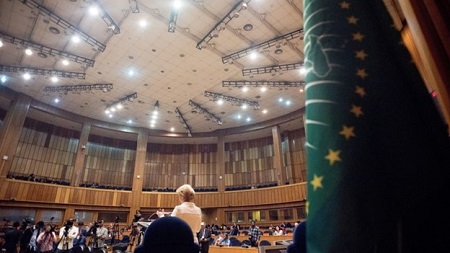Green farming ambition is a hot potato ahead of EU-AU summit
The issue of vaccine hoarding and African vaccine production is likely to dominate the long-delayed EU-African Union (AU) summit but both sides want to beef up cooperation on agriculture policy as well.
The much-awaited sixth meeting of the EU’s and AU’s heads of states and governments will take place in Brussels on 17–18 February, two years after the European Commission published its blueprint for a ‘strategic partnership’ with Africa.
The EU is keen to use the ‘partnership’ to encourage African states to adopt the environmental policies in its Green Deal. However, the pandemic has prompted a recalibration of priorities among African countries.
In particular, the major disruption to production and supply chains has pushed many states to focus more on increasing domestic production and reducing their reliance on imported food.
The AU sees the ‘partnership’ process as an opportunity to give its governments and regional blocs more leeway to build up industrial capacity and markets. According to the World Bank, 23% of sub–Saharan Africa’s GDP comes from agriculture.
Contacted by EURACTIV, the European Commission said it is too early at this stage to know about a list of agriculture topics to be discussed at the summit.
In the context of the revamped partnership with Africa, the EU is expected to support concrete actions for the development of intellectual property when it comes to African foodstuffs, for instance.
Last May, the European Commission approved the registration of South Africa’s Rooibos/Red Bush in the bloc’s quality scheme, which became the first African food to receive the status of geographical indication (GIs) in the European Union.
The AU has requested the support of UN food agency FAO to establish a continental strategy for GIs, a call that was picked up by other global institutions including the European Commission, the French Agency for Development (AFD), and the World Intellectual Property Organisation (WIPO).
The strategy for GIs in Africa was finally endorsed in October 2017, receiving the immediate support of the EU, which considers GIs as part of the intellectual property rights protocol of the African Continental Free Trade Area (AfCFTA), a flagship AU project [that] the EU has pledged to support fully.
EU-Africa move in step on Geographical indications revolution
The enormous tradition and diversity in African agricultural products may benefit from the use of the intellectual property tool for food protection that Europeans have been held most dear.
An own African food policy
The impact of the EU’s flagship food policy, the Farm-to-Fork strategy (F2F), may spill over into Africa and, more specifically, on small-scale African farmers.
In terms of concrete targets, the Commission proposed an ambitious 50% cut for the use and risk of pesticides, as well as a 50% reduction of highly hazardous pesticides, a 20% cut in fertiliser use and a 50% reduction of antibiotic use in farming and aquaculture, all by 2030 and compared to the EU’s current level.
African farmers fear that requirements to meet those targets, if they want to sell their products to Europe, could fast become a major hurdle to trade, as ramifications of the decisions taken at the EU level do not stop at its borders.
The biggest concern for African farmers is that the EU regulatory framework could become unfair because of the demands being imposed and the requirement to comply with no specific timelines to catch up with European farmers.
Last week, the Alliance for Food Sovereignty in Africa (AFSA), a network of 36 civil society actors, representing smallholder farmers and pastoralists, urged the African Union to endorse the initiative to develop an Africa Food Policy aimed at reducing reliance on overpriced imports.
Speaking at the launch of the initiative in Nairobi, AFSA chair Chris Macaloo commented that “production levels in Africa are down, thereby necessitating food imports.”
“The industrialized food production is not resilient to the effects of climate change and it contributes to greenhouse gas emissions, which result in global warming hence reducing productivity,” he said.
Million Belay, AFSA coordinator, added that “most of Africa’s policy space is already occupied by external actors and interests but now with the consultants working at African Union level and other key government non-government institutions, willing to work with the 23 countries, they can now actually write the Policy of Africa based on the wish of the people”.
Unintended consequences
The EU also wants its recently launched Global Gateway, modelled on China’s Belt and Road investment programme, to be at the heart of what it describes as “innovative financing solutions for the EU-AU partnership, economic recovery and the twin digital and green transitions”.
At last month’s EU-Africa business summit in Marrakech, experts argued that increased private sector investment and policy implementation was needed to drive the growth of African agriculture.
Samira Rafaela, a Dutch Liberal MEP, said the EU’s Farm to Fork strategy, with its green aspirations, was important but stressed that it was equally important that in enforcing its standards, it does not have the unintended consequence of excluding African farm products.
She urged the EU to contribute to the development of farming in Africa, while still respecting local methods that have been honed by generation and shown to work.
“We must ask how we can incorporate some of these methods that work into the mix of agricultural production and international trade,” she said.
Original article [edited by Zoran Radosavljevic]
This article is part of our special report Ripple effects: How EU decisions impact African farmers.
See also:
EU-Africa move in step on Geographical indications revolution Africa needs a Farm to Fork vision too, IFAD official says
Photo: European Commission President Ursula von der Leyen addressing African Union conference room in February 2020. Source: EU/ANSOTTE.
| Themes |
| • Access to natural resources • Agriculture • Farmers/Peasants • Food (rights, sovereignty, crisis) • Globalization, negative impacts • International • Public policies • Public programs and budgets |














